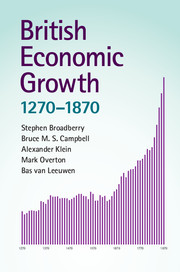Book contents
- Frontmatter
- Contents
- List of Tables
- List of Figures
- List of Appendices
- Preface and acknowledgements
- List of Weights, measures and money
- Prologue: Historical national income accounting
- Part I Measuring economic growth
- Part II Analysing economic growth
- 6 Real wage rates and GDP per head
- 7 Consumption
- 8 The social distribution of income
- 9 Labour productivity
- 10 Britain in an international context
- 11 Epilogue: British economic growth, 1270–1870
- Bibliography
- Index
11 - Epilogue: British economic growth, 1270–1870
Published online by Cambridge University Press: 05 January 2015
- Frontmatter
- Contents
- List of Tables
- List of Figures
- List of Appendices
- Preface and acknowledgements
- List of Weights, measures and money
- Prologue: Historical national income accounting
- Part I Measuring economic growth
- Part II Analysing economic growth
- 6 Real wage rates and GDP per head
- 7 Consumption
- 8 The social distribution of income
- 9 Labour productivity
- 10 Britain in an international context
- 11 Epilogue: British economic growth, 1270–1870
- Bibliography
- Index
Summary
Introduction
Between 1270 and 1870 Britain slowly progressed from the periphery of the European economy to centre-stage of an integrated world economy. In the process it escaped from Malthusian constraints and by the eighteenth century had successfully reconciled rising population with rising living standards. This final chapter reflects upon this protracted but profound economic transformation from the perspective of the national income estimates assembled in Part I and analysed in Part II of this book. Because Britain’s economic rise did not unfold in isolation, account is taken of the broader comparative context provided by the national income reconstructions now available for several other Eurasian countries: Spain from 1282, Italy from 1310 and Holland from 1348, plus Japan from 725, China from 980 and India from 1600. All are output-based estimates but have been derived via a range of alternative approaches according to the nature of the available historical evidence. Several make ingenious use of real wage rates and urbanisation ratios (Malanima, 2011; Álvarez-Nogal and Prados de la Escosura, 2013), two economic indicators often used as surrogates for estimates of GDP per head. Only the GDP estimates for Holland, like these for Britain, have been made the hard way, by summing the weighted value-added outputs of the agricultural, industrial and service sectors and then dividing the results by estimates of total population obtained by reconciling time-series and cross-sectional demographic data. Methodologically, the British and Dutch national income estimates are therefore the most directly comparable. Each is free from overdependence upon any single or narrow range of data series and, instead, they encapsulate variations in the wide range of economic indicators, appropriately weighted in line with their importance in overall economic activity, from which they have been reconstructed.
- Type
- Chapter
- Information
- British Economic Growth, 1270–1870 , pp. 402 - 428Publisher: Cambridge University PressPrint publication year: 2015
- 20
- Cited by



